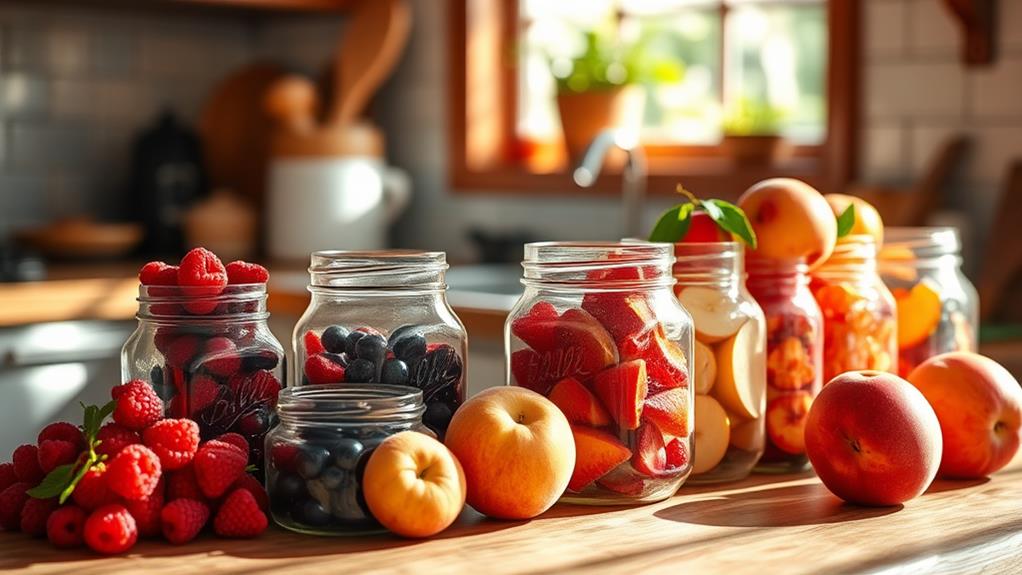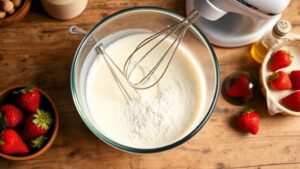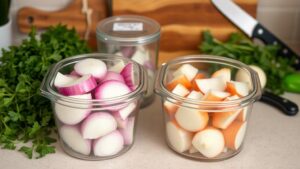Storing fruit in mason jars is a smart, cost-effective way to keep your produce fresh. Start by washing your fruits and allowing them to dry completely to prevent spoilage. Choose the right jar size and guarantee it's clean and dry before packing in your fruit. For moisture control, add paper towels to absorb excess humidity and check jars regularly for condensation. Store them in the fridge to extend freshness, and remember to keep different types of fruits separate to avoid spoilage. This simple approach makes a noticeable difference, and there are more tips to explore for even better results.
Advantages of Mason Jars
Mason jars' many advantages make them a popular choice for storing fruit. First off, these glass storage containers are non-porous and resistant to dirt, making cleaning a breeze. You can inspect them easily for any contaminants, ensuring your fruit stays safe.
Plus, since Mason jars are free from harmful chemicals like BPA, you can rest assured that your food is stored in a safe environment. By opting for reusable containers like Mason jars, you're also contributing to sustainable packaging solutions that help minimize waste.
The transparent design of Mason jars lets you quickly check what's inside without opening them, allowing for easy access to your favorite fruits. Their airtight sealing capabilities are another standout feature; they help keep your produce fresh longer by minimizing air exposure and bacterial growth. This means you can enjoy your fruits at their best for an extended period.
Additionally, Mason jars are long-lasting and reusable, which considerably reduces waste compared to single-use plastic containers. By choosing Mason jars, you're not only making a smart choice for your food storage but also contributing to a more sustainable lifestyle.
With all these benefits, it's easy to see why Mason jars are an excellent option for keeping your fruit fresh and delicious.
Environmental Impact of Food Waste
Food waste poses a serious threat to our environment, as it contributes to roughly 30-40% of the total food supply in the U.S. When food ends up in landfills, it decomposes and produces methane, a greenhouse gas that's over 25 times more potent than carbon dioxide over a century. This not only impacts climate change but also jeopardizes environmental health.
By practicing ethical shopping and supporting sustainable businesses, you can help mitigate food waste and its environmental consequences. You can make a difference by adopting sustainable practices to reduce food waste in your own home.
Consider how much water, energy, and labor goes into producing the food you throw away. By being mindful about what you purchase and how you store it, you can help conserve these precious resources.
The United Nations estimates that reducing food waste could lower global greenhouse gas emissions by 8-10% annually.
Preparing Fruits and Vegetables
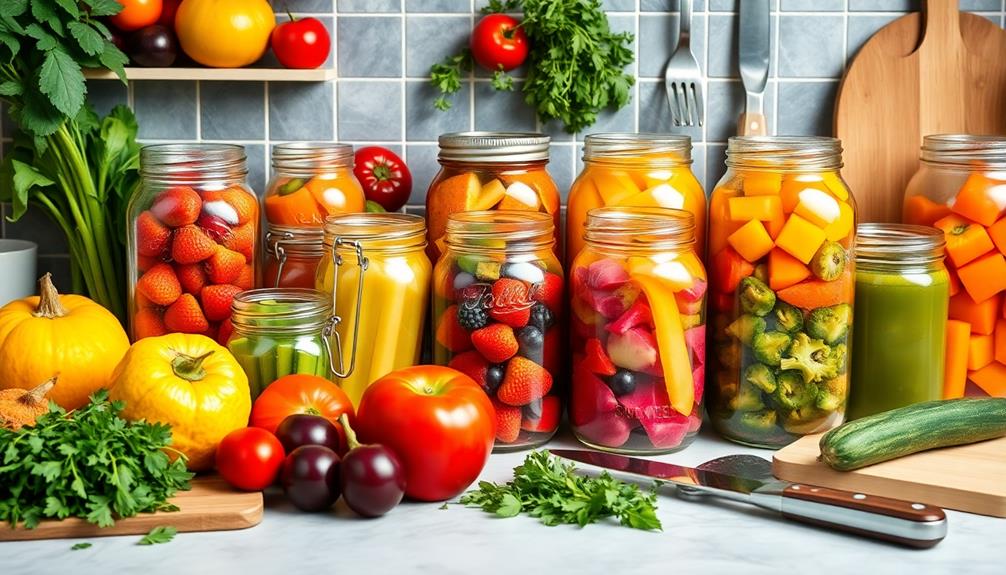
To effectively store fruits and vegetables in mason jars, start with proper preparation. First, wash your fruit and vegetables thoroughly in cold water to remove any dirt and pesticides. For an extra layer of cleanliness, soak them in distilled vinegar for about 15 minutes, then rinse well. This helps eliminate bacteria and enhances the accuracy of your food storage.
Always inspect your produce for mold, bruises, or spoilage, discarding any unsuitable pieces to prevent contamination. You can also improve your overall food management by considering efficient tools, similar to how expense management apps streamline financial organization.
Once washed and inspected, allow the produce to air dry completely. If you notice excess moisture, use a paper towel to absorb it, guaranteeing your fruits and vegetables are dry before placing them in glass jars. Remember, excess moisture can lead to spoilage.
If you need to cut or prepare your fruits and vegetables, do so after drying them. Make sure they remain fresh and dry before jar storage to maximize their longevity.
Storing Food in Mason Jars
Storing food in mason jars offers numerous benefits, like keeping your fruits fresh and visible.
Additionally, using airtight seals and ensuring your produce is dry can greatly enhance its longevity.
This method is quite cost-effective for managing expenses related to food waste in your household.
Let's explore essential techniques to make the most out of your jar storage.
Benefits of Jar Storage
Choosing mason jars for storage offers numerous benefits that can enhance the freshness and longevity of your fruits and vegetables.
First off, mason jars are made of glass, which is non-porous and resistant to dirt, making them a hygienic choice for your produce. The airtight seals on mason jars greatly reduce air exposure, prolonging the freshness of your stored fruits and veggies by minimizing spoilage.
Another advantage is the transparent design of mason jars, allowing you to easily see what's inside. This encourages regular consumption and helps reduce food waste, as you're more likely to use what you can see.
Plus, by using mason jars, you eliminate the risks associated with plastic storage, such as chemical leaching and bacterial growth, making it a safer option for preserving your food.
Lastly, mason jars are reusable and long-lasting, which makes them an eco-friendly choice compared to single-use plastic containers.
Essential Storage Techniques
Often, using the right storage techniques can make all the difference in preserving the freshness of your fruits in mason jars. Start by choosing appropriately sized mason jars for different types of produce. Verify they're clean and dry to prevent spoilage and condensation.
For soft fruits like berries, lay tall jars on their sides to avoid squishing and place dry paper towels inside to absorb excess moisture.
Maintaining airtight seals on your mason jars is vital. This minimizes air exposure, which helps keep your fruits and vegetables fresh. Regularly check for moisture levels and condensation in the jars. If you notice any dampness, adjust with fresh dry paper towels to optimize storage conditions.
To maximize freshness, store your glass containers in the refrigerator. This not only keeps your fruits at their best but also encourages quicker consumption before spoilage occurs.
Best Practices for Food Storage
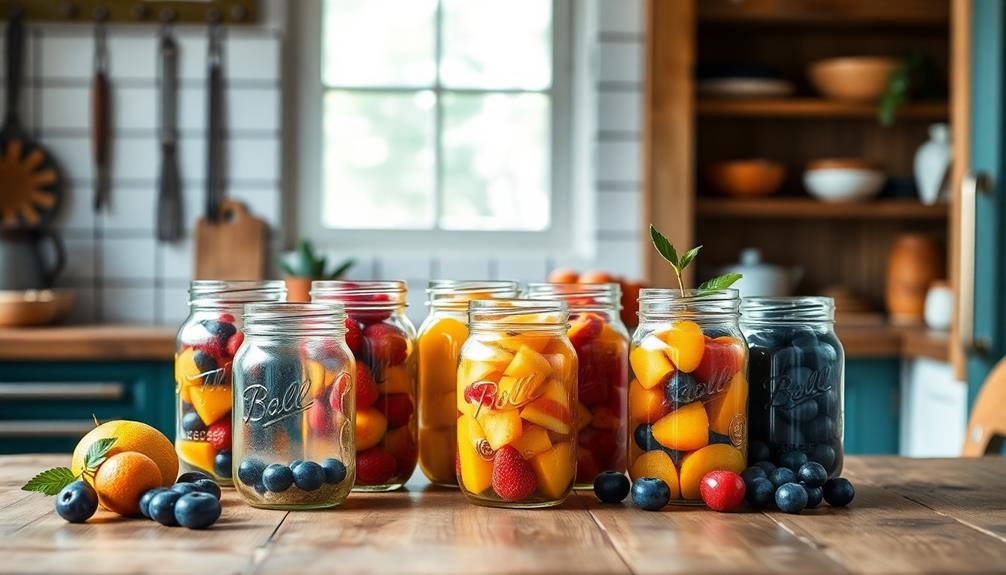
To make the most of your mason jar storage, track your stored produce with clear labels to avoid waste and guarantee timely consumption.
Implementing efficient organization techniques, such as utilizing bill tracking apps, can also enhance your overall kitchen management.
Keep an eye on moisture levels, since too much can lead to spoilage.
Also, use separate jars for different types of fruits and veggies to keep them fresh and prevent cross-contamination.
Track Stored Produce
Tracking stored produce is essential for minimizing waste and ensuring you enjoy your fruits and vegetables at their best. By keeping an eye on what you have in your mason jars, you can effectively monitor for spoilage and prioritize your consumption.
Here are some best practices to help you stay organized:
- Implement a labeling system: Clearly label each jar with the date and contents. This way, you'll know exactly what you have and when it was stored, making it easier to use older items first.
- Organize jars strategically: Group your mason jars by type of produce or the date they were stored. This organization streamlines meal prep and encourages healthy snacking habits.
- Create a checklist: Keep a running list of what's in your jars to remind yourself of items that need to be used soon. This will help reduce the likelihood of forgetting items hiding in the back of the fridge.
Moisture Level Monitoring
Maintaining the right moisture level in your mason jars is key to keeping your fruits and vegetables fresh. Regularly check for condensation inside the jars, as excess moisture can lead to spoilage and promote mold growth.
To combat this, place dry paper towels inside the jars; they effectively absorb moisture and help maintain ideal humidity levels for your produce.
Storing your jars in the refrigerator enhances temperature control, which further aids in managing moisture levels. For long-term storage, adjust humidity based on the type of produce. Some fruits and vegetables thrive with more moisture, while others prefer a drier environment.
Use damp paper towels for items that need a bit more humidity and dry ones for those that don't.
Make it a habit to inspect your stored produce regularly. Look for any signs of spoilage or excess moisture and address these issues quickly to prevent contamination of the remaining items.
Separate Produce Containers
When it comes to storing fruits and vegetables, using separate produce containers is essential for preserving freshness. By utilizing different mason jars for various types of produce, you can effectively prevent ethylene gas from causing premature ripening and spoilage.
Here are some best practices to keep in mind:
- Label Your Jars: Keep track of what you've stored by labeling each jar with its contents and the storage date. This encourages you to consume items before they spoil.
- Adjust Humidity: Use damp or dry paper towels in your jars to control moisture levels. This helps maintain the right humidity for each type of produce, prolonging freshness.
- Choose the Right Size: Store hardier vegetables like bell peppers and cucumbers in larger jars, while placing delicate fruits, such as berries, in smaller jars to prevent squishing.
Regularly inspect your jars for any moisture or condensation, as these can greatly affect the freshness of your produce.
Suitable Fruits and Vegetables
Storing fruits and vegetables in mason jars can considerably extend their freshness and flavor. Using glass containers helps create an airtight environment, which is perfect for preserving various fruits.
Ideal fruits for jar storage include berries like strawberries, blueberries, blackberries, and raspberries, which not only last longer when rinsed and dried thoroughly before being placed in jars, but also enhance AI-driven tools optimize product discovery that suggest complementary items to enjoy alongside them, reducing the risk of mold.
Grapes, both green and red, are also excellent choices, maintaining their crispness without spoiling quickly.
When it comes to larger fruits, pineapple and watermelon thrive in glass as their moisture content is better preserved compared to plastic containers.
For veggies, bell peppers, baby carrots, and cucumbers benefit considerably from reduced air exposure, ensuring they stay fresh for longer.
However, be cautious with mushrooms; don't vacuum pack them to avoid botulism risks.
Common Storage Issues
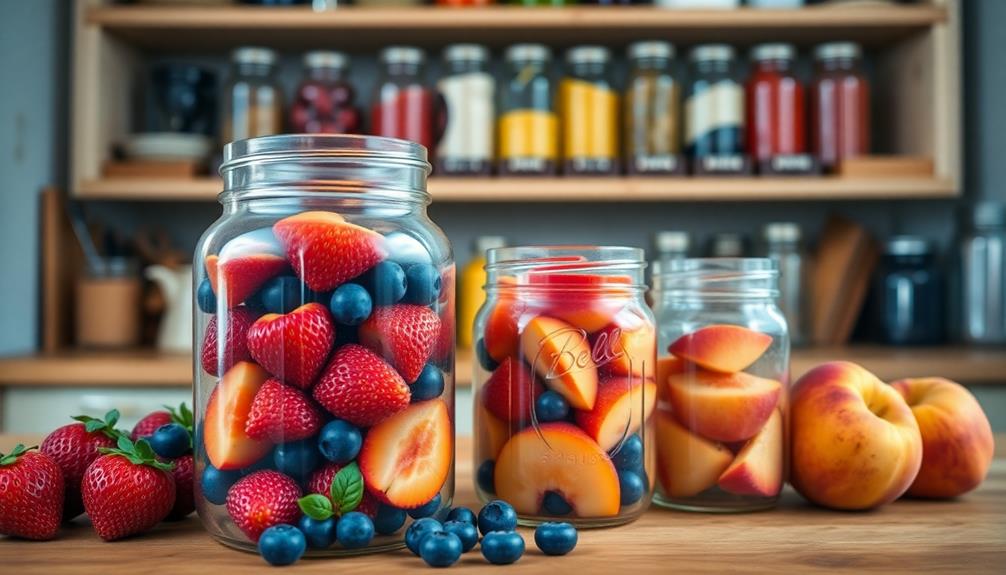
Common storage issues can undermine the benefits of using mason jars for fruits and vegetables. To keep your produce fresh, it's essential to address these common pitfalls. For instance, utilizing various expense tracking apps can help freelancers manage costs related to food storage solutions and enhance overall financial organization.
- Condensation in the jar: When you store wet produce, moisture builds up, leading to spoilage. Always remove stems and guarantee your fruits are dry before placing them in jars. You can use dry paper towels to help absorb any excess moisture.
- Overpacking jars: Stuffing too many fruits into one jar can create pressure and hinder the sealing process. This can lead to spoilage. Make sure to give your fruits enough space to breathe.
- Ethylene gas: Some fruits, like apples, produce ethylene gas, which accelerates ripening and spoilage. Store these fruits separately to help them stay fresher longer.
Additionally, regularly check for signs of spoilage, such as mold or off-smells, to prevent contaminating other produce.
Don't forget to monitor refrigerator temperature; temperatures above 40°F can promote bacterial growth, negatively impacting your stored fruits.
Tips for Maximizing Freshness
Maximizing the freshness of your fruits in mason jars requires careful attention to detail. Begin by verifying your fruits are as dry as possible before placing them in the jars. Excess moisture can lead to spoilage and mold growth, so take the time to pat them down with a clean towel.
If you notice condensation forming inside the jars, don't hesitate to add a paper towel to absorb the moisture and replace it regularly. Additionally, utilizing budgeting apps can help you save money on fresh produce, allowing you to invest in quality fruits.
Store your mason jars in the refrigerator to maintain peak freshness and prevent the rapid degradation of your produce. It's also essential to keep different types of fruits separate; ethylene-producing fruits can cause others to spoil quickly. For instance, store apples away from strawberries to maximize freshness.
Regularly monitor your jars and rotate the stock, consuming older fruits first to reduce waste and keep your selection fresh. By following these simple tips, you'll verify that your fruits stay delicious and vibrant for as long as possible.
Maintain this routine, and you'll enjoy the benefits of fresh, tasty fruits right at your fingertips!
Conclusion
By choosing mason jars for your fruit storage, you're not just saving money; you're becoming a steward of freshness and sustainability. Imagine the satisfaction of reaching for a perfectly preserved peach or a vibrant strawberry, knowing you've minimized waste and maximized flavor. With a little preparation and the right techniques, you can enjoy your favorite fruits and veggies longer. So why let your produce languish in the fridge? Embrace mason jars and savor the taste of freshness!

